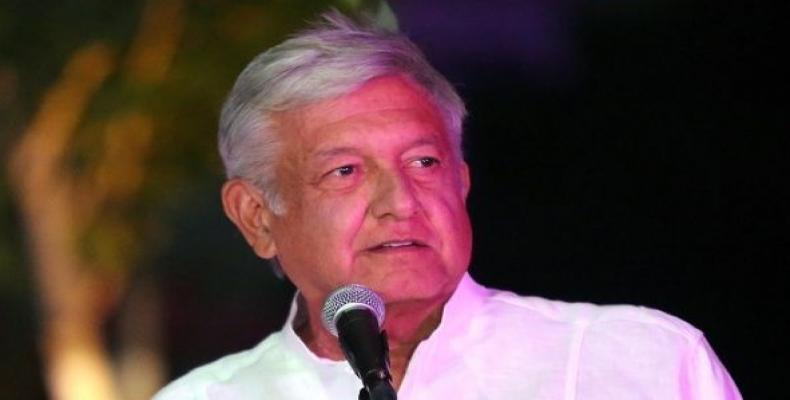Mexico City, June 15 (RHC)-- In Mexico, presidential candidate Andres Manuel Lopez Obrador, AMLO, says that his country should redirect the economy towards the internal market if renegotiations with Donald Trump fail.
With Trump playing the role of spoiler in trade negotiations and agreements with most of United States' key import partners, the front-runner in Mexico's presidential elections has said would revive the rural economy to deal with a collapse of the North American Free Trade Agreement.
“I am going to suggest that the treaty remains, but (the end of NAFTA) cannot be fatal for Mexicans, our country has a lot of natural resources, a lot of wealth,” said Lopez Obrador in the last debate before between presidential candidates in the city of Merida, Yucatan state.
At the beginning of his administration, Trump threatened to pull out of the agreement with Canada and Mexico if they refused to renegotiate it. However, the negotiations, which started on August 16, 2017, have advanced slower than expected and have been hampered by Trump's decision to impose a 35 percent tariff on steel and a 10 percent tariff on aluminum imported from both Mexico and Canada. Shortly after, as the seventh round of renegotiations concluded, Trump said he would exempt Mexico and Canada from those tariffs if they agreed to a new NAFTA.
Trump has called NAFTA the “worst trade deal in history” because of the massive deficit with Mexico and supposedly unfair conditions.
In 2017, the U.S. bought $71 billion more imports from Mexico than what Mexico got from the United States. Mexico dramatically increased their farm exports to the U.S. since 1994, the year NAFTA was implemented, and hundreds of thousands of auto-manufacturing jobs have been created. But in fact, the agreement hasn't helped Mexico to counter its economic problems and has even widened them.
Between 1993 and 2013, Mexico's economy grew an average of a paltry 1.3 percent, unemployment has increased, and poverty rates remain at the same level as in 1994. Farmers and members of the National Zapatista Liberation Army have opposed the deal since the early 1990s citing the detrimental impact it has had on low-scale farmers across the country. Now that the country's politicians and business elite are discussing it again these issues have resurfaced.
Lopez Obrador has declared himself a supporter of a more internal market-oriented economy, and admirer of Mexico's import substitution policies. Last week, Lopez Obrador's chief economic adviser Gerardo Esquivel said that “no NAFTA is better than a bad NAFTA” while articulating the center-left candidate's policy on trade, but said they are committed to the renegotiation of the agreement.
"We are not looking for a bilateral agreement with the U.S. or Canada. The trilateral agreement is what we want,” he said. The renegotiations may last until after Mexico's July 1st presidential elections, but the winning candidate won't be sworn in until December.
With just over two weeks before voters head to the polls, the debate was one of the last chances for the pack of trailing candidates to whittle down leftist Lopez Obrador’s lead. The four contenders tussled over their visions for changes to Mexico’s healthcare and educations systems, but neither landed any game-changing knockout punches.
The former Mexico City mayor, in his third bid to reach the presidency, came out unscathed from two prior debates and has since widened his double-digit lead in most polls. He has double the support of Ricardo Anaya, who heads a right-left coalition, according to a nationwide survey published earlier this week.
Presidential candidate says Mexico would survive collapse of NAFTA by focusing on internal markets, rural economy


